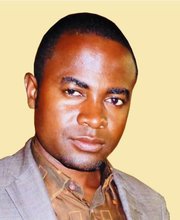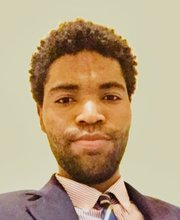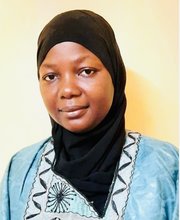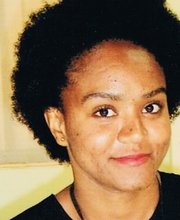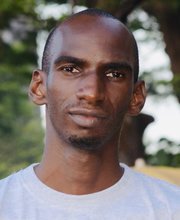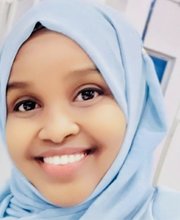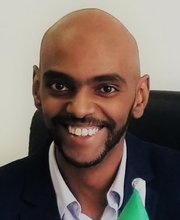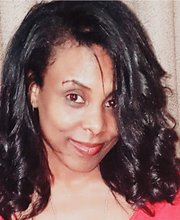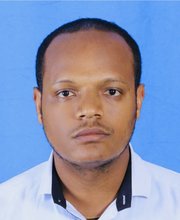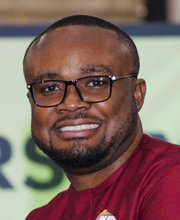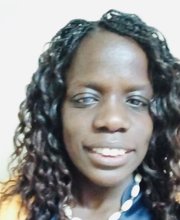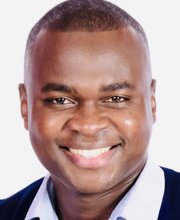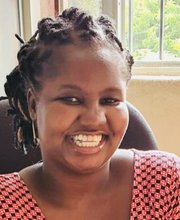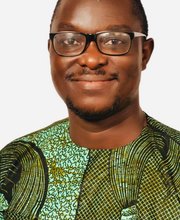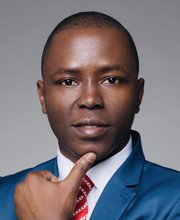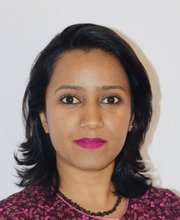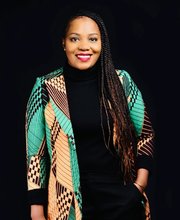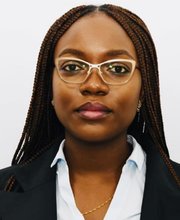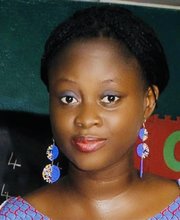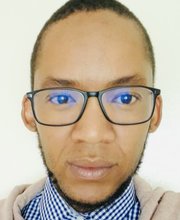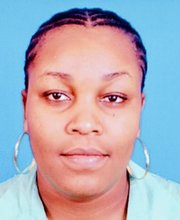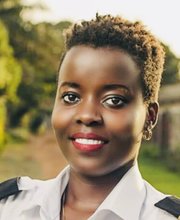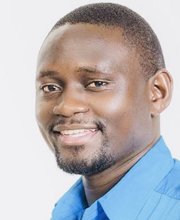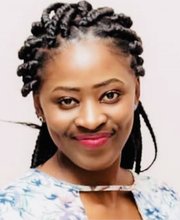Meet the 2021 BSU Fellows
Madaleno Satumbo Constantino
Country: Angola
Areas of Interest: Public management, leadership, sustainable development
Pronouns: he/him/his
Madaleno Satumbo Constantino’s awareness of his country’s post war educational problems prompted him to become a teacher. Realizing the need for organizations to facilitate communication between local residents and government in order to find solutions for problems such as youth criminality, the lack of water and power, and children without registration, he promoted the formation of a community association, bringing residents from varying political parties, religions, and social classes together with unifying language and a perspective of brotherhood in differences, saying, “None can change our way of life if we don't change ourselves; we are brothers, and our children's future is influenced by our good or bad practices today.” Madaleno hopes to gain effective skills and knowledge in the areas of public management and leadership from the program, to help him prevent future generations from facing the hardships brought about by war, corruption, and indifference.
Justino Chipunji Jamba
Country: Angola
Areas of Interest: Education, representation, promoting positive change
Pronouns: he/him/his
In addition to his work as an English teacher at a public school, Justino Chipunji Jamba donates his time and expertise teaching English and other subjects to hundreds of children and adults. He considers the construction of the English Center in his home municipality of Caala —` the first in the region — to be his greatest achievement. Justino has always dreamed of being an ambassador for his people and culture, and hopes the program will aid in strengthening his strategic thinking and communication skills so that he may work with local residents and the government to solve the issues faced by his and other communities. He says, “I want to create opportunity for anyone, ensure that the most vulnerable have their voices heard, and safeguard their right to have their views and wishes genuinely considered when decisions are being made about their lives.”
Bintou Ouedraogo
Country: Burkina Faso
Areas of Interest: Women’s rights and education, human resource management
Pronouns: she/her/hers
With a Master’s degree in law, Bintou Ouedraogo was recruited by the police, serving as a Commissioner and Chief of Judicial Police before being named Human Resources Manager to oversee the continued training of police officers and ensure recognition for meritorious service. She would like to expand her knowledge of human resource management to facilitate the modernization of the police force.
An advocate for women’s rights, Bintou successfully organized free medical screening and immediate treatment for cervical and breast cancer for policewoman and wives of the policemen in her office. Burkina Faso’s mortality rates are among the highest in the world. “This is close to my heart,” she said, “because women often have no access to testing until it’s too late.” Bintou has led conferences to raise awareness of the sexual abuse of women and children. Her goal is to find partners to assist in this work and help girls forced to leave school because of pregnancy or forced marriage.
Ketline Delcy Dos Reis Cabral Semedo
Country: Cabo Verde
Areas of Interest: Medicine, education, women’s and children’s rights
Pronouns: she/her/hers
Ketline Delcy Dos Reis Cabral Semedo’s desire to reduce the suffering of families who lose loved ones to senseless deaths led her to become an imaging and radiography engineer with the Scientific Investigation Team of the Judiciary Police at the Ministry of Justice in Praia, where her passions for forensic radiology and improving investigation techniques assist in solving crimes and giving answers to the grieving families. In an effort to prevent crime attributed to the high school dropout rate, Ketline initiated a project aimed at guiding children in their education in Ponta d´Agua, a suburb of Praia, with a goal of expanding to other suburbs to reduce the dropout rate 10 percent by 2025. Ketline says, “Designing and coordinating innovative strategies and policies to offer equal opportunities and rights for education is crucial to preventing crime in Cabo Verde.” She is eager to learn best practices in community development, innovation, and organization from the program to aid in her goals of reducing the dropout rate and creating better conditions for young people.
Bello Mohamadou
Country: Cameroon
Areas of Interest: Education technology, online training platforms, multimedia learning
Pronouns: he/him/his
Bello Mohamadou is currently the Discipline Master for a public secondary school, where he teaches English as a Foreign Language. He is also a pedagogic advisor for a private school, lecturer, and leader of the team creating Massive Open Online Courses (MOOC) at the University of Ngaoundéré. He says, “I chose to be a teacher to help people in my community learn more English for better global collaboration. Teaching is the best way to share values.” Bello chose the Public Management track to expand his knowledge of collaboration, modern education, and education technology, and hone his networking and presentation skills. He plans to use what he learns to improve the content on his online education platforms and aid in the creation of a Teacher Continuing Development Program (TCDP) in the next few months. With the collaboration of the organizers of the Global International Pedagogical Forum, he hopes to transform the TCDP to a teacher training school in the future.
Hidaya Mohamed Abdillahi
Country: Djibouti
Areas of Interest: Journalism, leadership, management
Pronouns: she/her/hers
Hidaya Mohamed Abdillahi is a television news presenter and Editor in Chief of the English News Section for Radio-Television Djibouti. She has covered national and international events and worked closely with the presidency of the republic and the Prime Minister's Office to set up a unit that will focus on monitoring and evaluating the activities of the members of the Government. Journalism is a passion for her, as it encompasses reading, writing, and sharing ideas and information. A Mandela fellow in 2016, Hidaya used the skills she acquired to guide, serve, and motivate her team. This year, she will focus on acquiring leadership and management skills that will equip her to gain an in-depth understanding of government structures, focus on service delivery, and work in a team environment. Hidaya’s goal is “to be the voice of my community by using my skills as reporter and calling on Ministers and other political actors to join my pursuit for a better world and an informed community.”
Biniam Yayehyirad Kitaw
Country: Ethiopia
Areas of Interest: Technology, education
Pronouns: he/him/his
Biniam Yayehyirad Kitaw is currently the Country Manager of Camara Education Ethiopia, an international NGO dedicated to delivering real impact through technology. Over the past year, he led the final dispatch of 4,500 PCs to schools as part of an agreement with the Ministry of Education, and negotiated a new agreement to dispatch 21,000 PCs to 840 schools, train 5,040 Educators and ultimately impact over 500,000 students over the next 3 years. Biniam says, “I want to contribute to improving education for every child in Ethiopia. I believe technology will play a key role in that endeavor.” Biniam aspires to take on a regional role at Camara within the next 3 years. Through the program, he hopes to build on two competencies: financial management in public and non-profit organizations, and regional economic and workforce development. These skills will help him to improve Camara's financial operations and understand the structures of other organizations.
Rozina Girmay Reda
County: Ethiopia
Areas of Interest: Human rights, project management, advocacy, gender policy
Pronouns: she/her/hers
Rozina Girmay Reda earned an MSc in International Cooperation and Humanitarian Aid from the Humanitarian Study Center in Spain. She has worked for different governmental, international NGO, and UN organizations in Ethiopia and other countries in the areas of protection, GBV Prevention and Response (GBViE), migration and Legal-Aid/access to Justice programs management. Working in refugee camps, remote areas, and humanitarian settings has instilled a passion in her for human rights, community work, and the protection and empowerment of women and girls. Rozina’s vision is to “create an inclusive, community-based platform, starting in Ethiopia and East African countries, which promotes equality for vulnerable and disadvantaged communities such as women, girls, children, elders, people with disabilities, and refugees, and acknowledges their strengths, talents and contributions to the community and societies across Africa.” She believes the program will provide her with crucial skills in effective and efficient public management, fundraising, networking, entrepreneurship, and leadership.
Bekalu Wubshet Zewdie
Country: Ethiopia
Areas of Interest: Health and Higher education leadership
Pronouns: he/him/his
Bekalu Wubshet Zewdie received his MD from Addis Ababa University. He is a co-founder of the Department of Orthopedics and Trauma Surgery at Bahirdar University, and has recently completed his studies in those areas. He is also the founder and first president of Afilas Pharmaceuticals Manufacturing and Medical Services, S.C. In addition to his private practice, he teaches and gives clinical service at a university hospital. Bekalu says, “It is our daily pain to have a lot of deaths from curable and treatable conditions.” His goal is to act as an advocate, expert, and policy consultant in securing full access to contemporary curative medicine for his community and, eventually, all of Ethiopia, with special focus on children, women, and the elderly. He will make use of what he learns in the program to develop his communication and interaction skills, and hopes to talk with other fellows about public, business, and civic organizational systems in their respective countries.
Cornelius Afetorli Normeshie
Country: Ghana
Areas of Interest: Healthcare, public policy
Pronouns: he/him/his
Cornelius Afetorli Normeshie is a community development expert who studied medicine and trained as a clinician. He leads volunteers in implementing a holistic model of development through sustainable health solutions, water and sanitation projects, and economic empowerment. Partnered with the Ghana Health Service, they provide free medical care to underserved communities. He wants to be involved in policymaking for health in the country while implementing sustainable health solutions that create equal, affordable, and regular access to healthcare for all community members, and hopes the fellowship will give him a broader view of the public policy process with special attention to health. Cornelius’ goal is to increase volunteer numbers by 100 percent within five years through healthy volunteer engagements and effective and impactful programming. He plans to bring non-governmental organizations (NGO's) and government agencies to the communities to understand the needs of the people firsthand. He says, “The poor do not need much, they just need a voice who understands them and will care and fight for them.”
Lensa Dorothy Atieno Otieno
Country: Kenya
Areas of interest: Disability mainstreaming, parental education
Pronouns: she/her/hers
Lensa Dorothy Atieno Otieno’s professional life is dedicated to children. A social worker who also provides psycho-social support, she finds homes and schools for the children assigned to her and arranges access to desperately needed resources, including safety net programs that supply funds to the parents of children with severe disabilities in families living in poverty. Believing that education will end the cycle of child abuse prevalent in the country, particularly among the poor, Lensa Dorothy counsels parents on the impact their words and actions have on their children — “the parent as god” — and guides them to parenting classes and other support. “Children are the most helpless,” she says, “and they need as much help as they can get.” Determined to broaden her knowledge for the sake of her clients, she has registered for a Master’s degree in Gender and Development. She hopes the program will teach her to network and build professional relationships to aid her in achieving proper child and adolescent upbringing in her community and country.
Fredrick Omondi Oduor
Country: Kenya
Areas of Interest: Public administration, leadership
Pronouns: he/him/his
Fredrick Omondi Oduor serves as an Assistant County Commissioner in Baringo County. His key responsibility is to promote peace and security within the volatile Kerio Valley, where cattle rustling and female genital mutilation (FGM) have been a menace. These challenges prompted him to spearhead initiatives through which local people could share vital information. Both cattle rustling and FGM have been eradicated in his jurisdiction. As a career Public Administrator, Fredrick hopes to learn administration and management from a Western perspective in the program. He says, “Meeting other public servants from different countries, different sectors and different agencies who are striving to make positive changes in their communities will be an opportunity to hear their stories, appreciate diversity and learn some new leadership skills.” His goals are to create a network that will help him establish more facilities for the locals, such as sponsoring education for girls, financing the growing of hay, drilling bore-holes, and transforming lives. He would also like to establish an IT center in the area.
Patricia Quinn Owira
Country: Kenya
Areas of Interest: Global health, the effects of climate change on health
Pronouns: she/her/hers
Patricia Quinn Owira is a doctor currently working as technical lead for a First Time Young Mothers project, where she oversees the provision of sexual and reproductive health (SRH) services to adolescent girls and young women through community-based interventions. She also manages a key population HIV program that provides stigma-free comprehensive SRH services to sex workers, gays, and transgender. In addition, she volunteers at a gender-based violence recovery center that supports sexually violated children and youth. Through the program, Patricia aims to broaden her project management knowledge to include wider themes like regional workforce development, public finance management, foreign policy development and working across cultures. She hopes to form networks with young leaders from different parts of the world to find strategies and global solutions to address issues surrounding sexually violated children, adolescent girls and young women, and vulnerable populations. She says, “The consciousness of pursuing this fellowship will forever inspire me to have a lasting, positive impact in health leadership in low income and underserved settings in Africa.”
Peva F. Gbagornah
Country: Liberia
Areas of Interest: Health care policies, public awareness, disease prevention and treatment
Pronouns: he/him/his
Peva F. Gbagornah is a TB physician at Partners in Health, an international non-governmental institution providing support to government facilities in Liberia. As the majority of the doctors have a stigma against tuberculosis, he is the only doctor at the facility. As a child, he had a passion for helping people. He says, “The death of my beloved aunty from breast cancer deepened my resolve to join the medical profession in order to help others and save lives, thereby fulfilling my childhood dreams.” Peva believes the program will provide the skills and knowledge necessary to support the health sector of Liberia and serve as Medical Director at the TB annex. In the future, he hopes to provide technical support to the Government of Liberia in drafting health policies, to coordinate community-based screening and chemotherapy to women suffering from cervical and breast cancer, and to create a center of excellence for non-communicable disease with focus on diabetes and cancer prevention, early detection, and treatment, giving hope to those who could not otherwise afford it.
Charles Gbollie
Country: Liberia
Areas of Interest: Education, youth development, writing
Pronouns: he/him/his
Charles Gbollie is the founding Director of the Center of Excellence for Education Administration and Certification at Liberia’s Ministry of Education (MoE). A passionate educator, researcher, and writer, focusing on critical issues related to human, social, and educational development, he has previously served in management positions, including Basic Education Director, MoE. “I have chosen the path of education and youth development,” he says, “because they are at the core of societal transformation.” As part of his desire to impact the world, he has written two motivational books: The Youthful Champion and The Champion's Thought. Charles believes that his rigor and determination will be strengthened by the program, as it will result in new connections, better skills, and fresh ideas. With the lessons learned from other leaders' experiences, aspirations, and dreams, his desire will be rekindled and strengthened toward becoming a great role-model with a track record of impacting millions, and he will use the new network of friends and ideas to promote improvement of lives through research, education and empowerment programs.
Sharuna Doyal
Country: Mauritius
Areas of Interest: Psychological well-being, counseling, public policy
Pronouns: she/her/hers
Sharuna Doyal is a clinical psychologist for the Police Force, part of a small unit serving 13,000 officers. She carries out psychological assessments, provides psychological support and counseling to police officers and their families, and helps them manage the stress of police work. Focusing on prevention rather than intervention only, Sharuna introduced training on self-care and counseling skills and the psychological challenges for women and younger officers. She has also worked with students who are disparaged for being “academically weak” — many with learning difficulties — coaching them in small groups and individually. Although her training has had good outcomes, Sharuna would like to learn how developed countries like the United States and developing African Nations are dealing with similar problems through the program, and gain a better understanding of public policy. In the future, she says, “I hope to carry out research, make proposals for strategic action, and raise awareness so as to get more local and international support, especially in the face of rising drug abuse, stress, depression and general mental health decline.”
Chisom Ihebuzo Nwankwo
Country: Nigeria
Areas of Interest: Internal displacement issues, technology, community development
Pronouns: she/her/hers
Chisom Ihebuzo Nwankwo is a Scientific Officer in the Environmental Sciences Department with the Federal Ministry of Science and Technology. Currently, she heads the Knowledge Management/Innovation Desk and the Gender/Entrepreneurship Desk, and she is also part of the team that developed the Nigerian Cleantech Innovation Programme. With a team of friends, she started a non-governmental organization called The Skilled Women Initiative (TSWINI) to provide vocational skills, market access, and financial inclusion for internally displaced women and young persons. In the program, Chisom would like to learn sustainable ways of using technology and how to create an inclusive platform that can be deployed anywhere in the world. Her goal is to set up an innovative, hands-on, quick intervention mechanism for tackling Internal displacement not only in her home country of Nigeria but all over the world As she says, “Internal displacement can occur as a result of insurgency, communal clashes, climate change issues, natural disasters, war, or even domestic violence, and these issues can happen anywhere, and at any time.”
Adaora Esther Oji
Country: Nigeria
Areas of Interest: Advocacy, social change, community development
Pronouns: she/her/hers
Adaora Esther Oji works with COPEN group, an organization committed to providing affordable housing in Nigeria. Over 46% of Nigeria’s population lives on less than $1 a day. Born of a burning desire to contribute to social change, Adaora co-founded the Young Girls' Empowerment and Development Initiative (YGEDI), providing young girls (and now, young boys as well) with access to necessary knowledge, skills, and opportunities that empower them to contribute to national and global growth. With the aim of identifying and replacing limiting mindsets, YGEDI curates impactful programs for 700 adolescents in 4 underserved communities. In the program, she hopes to acquire skills in communication, dispute resolution, negotiation, and people management, improve on her written and verbal communication skills, and gain knowledge in policy formulation and administration. Adaora aspires to play a significant role in poverty alleviation in her country. She says, “Education is an effective tool in combating poverty. Leaving no one behind requires a bottom-up approach, and this has encouraged my active involvement in community development work.”
Lois Simche Lebbie
Country: Sierra Leone
Areas of Interest: Social work, gender, and youth
Pronouns: she/her/hers
Lois Simche Lebbie is currently a Social Services Officer at the Ministry of Social Welfare, Gender and Children's Affairs in Sierra Leone. She is also the Founder and Executive Director of Transformative Women’s Initiative, a community-based organization to empower women and girls. “I have chosen social work because it is a fast-growing field, composed of intelligent and emotionally strong professionals that represent the populations with the most need. It is a profession that produces agents of change who are not afraid to challenge antiquated policies, fight for social justice, and make the world a better place,” she said. Through this fellowship, she hopes to deepen her cultural competency and leadership skills, to build programs in Sierra Leone that advance gender justice and leadership capacity for women and youth.
Tshegofatso Claudette Phala
Country: South Africa
Areas of Interest: Human rights, social change
Pronouns: she/her/hers
Tshegofatso Claudette Phala is a human rights lawyer, with 10 years’ experience leading pro bono matters which have had an impact on the protection of the rule of law in South Africa and advanced the rights of LGBTI persons and persons with disabilities. In February 2019 she joined a pan-African, woman-led organization as the Senior Lawyer leading their Sexual Orientation and Gender Identity and Expression (SOGIE) work. Through this work, she supports the development of strategic litigation on SOGIE in Africa and empowers LGBTI social movements across Africa to use the law as a tool for social change. As a woman with albinism she has lived through discrimination. This struggle and marginalization inform her quest for social justice. Tshegofatso’s goal is to develop as a leader with the capacity to influence the social transformation of Africa, to think beyond just the law and beyond traditional thinking and become innovative in her approach to the work she does. She says, “I believe one of the most important attributes of a leader is humility. Humility has been described in South Africa as Ubuntu. Ubuntu is a Zulu word which means ‘humanity.’”
Tumelo Robert Ramongalo
Country: South Africa
Areas of Interest: Public management and leadership, human rights, youth empowerment
Pronouns: he/him/his
Tumelo Robert Ramongalo works for the Emfuleni Local Government Municipality, serving in two portfolio committees: (1) Petitions and (2) Corporate Governance, with the opposition party the Democratic Alliance. He has been elected Deputy Chairperson for his party's caucus. As Vaal Regional Youth Chairperson for the Democratic Alliance in 2016, he revitalized youth activism, creating innovative strategies to inspire political participation. The campaign was hailed as the largest DA youth participation in the history of the region. Tumelo would like to "build a political career based on the fact that I feel it is important to have more young people in the forefront of higher decision-making structures." To that end, he hopes the program will increase his knowledge of public management and leadership, economic development, financial management in public organizations, policy formulation, and foreign policy to assist him in his dream of becoming a Member of Parliament in 2024.
Sarah Joseph Chodota
Country: Tanzania
Areas of Interest: Ethics, anti-corruption
Pronouns: she/her/hers
Sarah Joseph Chodota is a Community Education Officer at the Prevention and Combating of Corruption Bureau. She designs anti-corruption behavior-change materials for youths, so they will learn never to tolerate corruption in their lives. Sarah is focused on "empowering young girls to become champions by overcoming sextortion." Last year, she introduced a Break the Silence campaign to fight sexual corruption, targeted toward schools and universities, where young people are known to be victims of such offenses as demanding sex in exchange for good grades. She has raised funds to educate girls on ways to fight sexual corruption, created a WhatsApp group where girls and boys can report sex offenders, and convinced the Ministry of Education and Vocation Skills to incorporate anti-corruption studies into the primary school curriculum. Before turning to the school system, she secured funding to raise awareness of sextortion used against women seeking employment. Sarah is interested in gaining interpersonal, problem solving, planning, and organizational skills from the program. Her goal is to promote ethics in youths of all ages by developing curriculum to teach integrity and anti-corruption.
Ashaba Faridah
Country: Uganda
Areas of Interest: Girl child education and empowerment
Pronouns: she/her/hers
Nabwami Faridah Ashaba is the founder and CEO of Bambino Life Foundation, an organization that promotes girl child education and empowerment and the welfare of children living in orphanages. She is also the managing director of STEM Queens Ug, an organization that encourages young girls to participate in science, technology, engineering and mathematics, and the chairperson of the Uganda chapter of Global Goodwill Ambassadors. Faridah's organization works to solve the problems that cause girls to drop out of school. They teach girls in rural areas hands-on skills, allowing them to start their own small businesses to sustain themselves while attending school, and work to sensitize the communities to gender-based and sexual violence, often without assistance from local authorities. This year alone, they have helped to empower 3,000 girls. Faridah hopes to learn more about running a non- profit organization and leadership skills in the program, and to learn from the experiences of others. In addition to keeping girls in school, she wants to help sexually abused girls by teaching them entrepreneurial skills to sustain and support themselves. Her goal is to help one million girls.
Allan Mudenda Hagwelele
Country: Zambia
Areas of Interest: Youth empowerment, government processes, problem-solving
Pronouns: he/him/his
Allan Hagwelele currently serves as the Membership Secretary for the Library and Information Association of Zambia. He was among 17 librarians who took part in the Initiative Young African Library Innovators (IYALI) held in Lithuania and Poland, and was selected a Trailblazer: Librarians Leading Change, a program supported by the Bill and Melinda Gates Foundation. It is his belief that youth empowerment is key if a community is to harness its potential for the better. He has initiated youth meetings within the library space where various discussions take place, and has trained youths in short courses that include, but not limited to, Introduction to computers, Microsoft office, university application online, preparing a curriculum vitae, and entrepreneurship. In the program, he would like to learn how to maximize teamwork, leverage collaboration with private groups or companies to bolster public programs, government processes, utilizing written and verbal communication in management, and problem-solving. Allan says, "I see myself as community change initiator that will leave a mark for the generations to come."
Himweetwa Lubinga
Country: Zambia
Areas of Interest: Inclusive education, public management
Pronouns: she/her/hers
Himweetwa Lubinga is an information specialist at a public library under the Ministry of Local Government. Her work allows her to provide information needs and services to diverse groups of the community thereby equipping them with life-long learning skills. She believes that children instilled with a positive reading culture can bring development to their communities. Her proposal to end membership fees for children under 15 increased the number of children accessing the library from 40 per month to 300. During World Literacy month, she conducted reading sessions with deaf children using joint picture books through sign language, which improved their comprehension and interest in learning to read themselves. Himweetwa hopes to learn about US Government policies and programs for inclusive education, how US libraries embrace their roles as social service hubs for youth, and public management leadership. Her goal is to "increase the reading culture of ch through developing and implementing library policies that promote inclusive Education participation for every child, including those who are deaf, hard of hearing, deaf-blind, or dyslexic."
